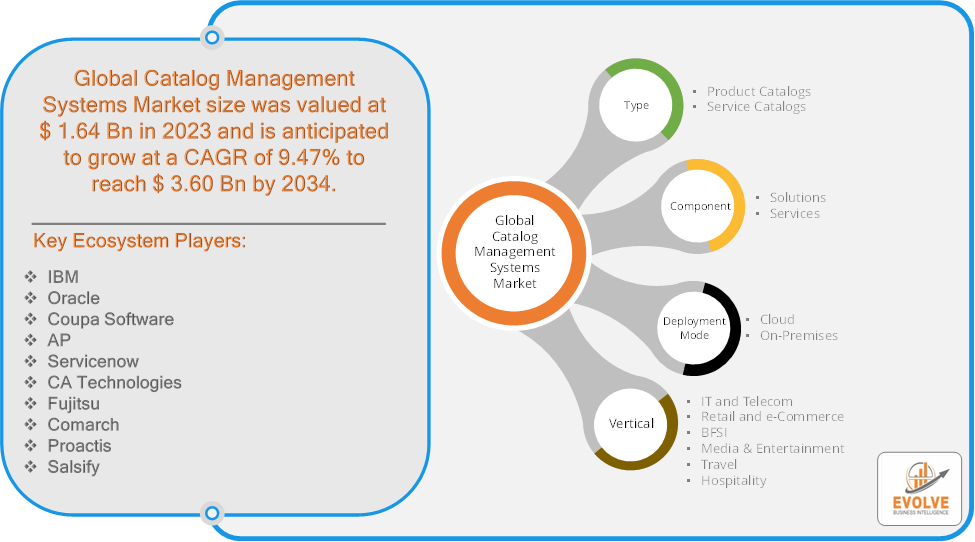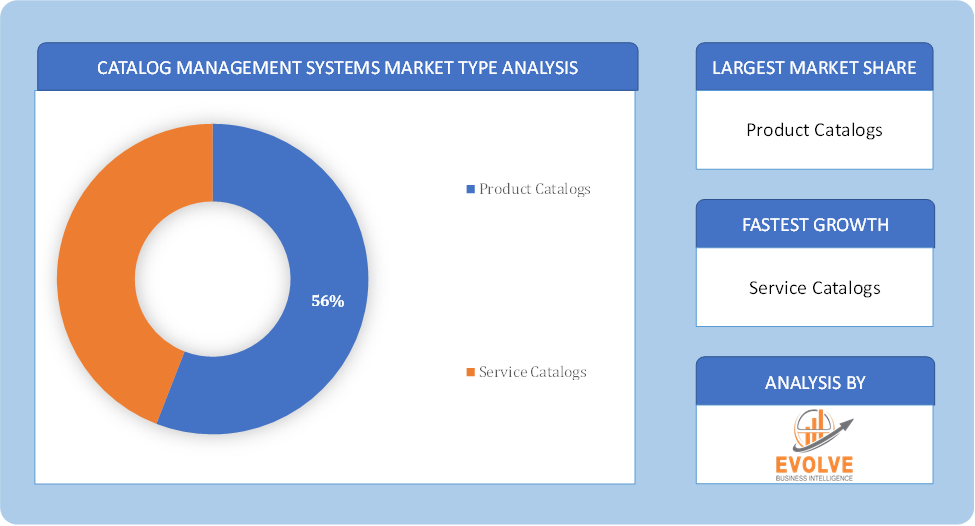Catalog Management Systems Market Overview
The Catalog Management Systems Market size accounted for USD 1.64 Billion in 2023 and is estimated to account for 2.45 Billion in 2024. The Market is expected to reach USD 3.60 Billion by 2034 growing at a compound annual growth rate (CAGR) of 9.47% from 2024 to 2034. The catalog management systems market refers to the industry that provides software solutions for creating, managing, and distributing catalogs. These catalogs can be physical or digital and are used by businesses of all sizes, from small retailers to large corporations.
The catalog management systems market is expected to continue to grow in the coming years, driven by the factors mentioned above. As businesses become increasingly reliant on catalogs to reach their customers, the demand for effective catalog management tools will only increase. The Catalog Management Systems Market is crucial for businesses aiming to streamline their product management processes and enhance their market presence.
Global Catalog Management Systems Market Synopsis
 Catalog Management Systems Market Dynamics
Catalog Management Systems Market Dynamics
The major factors that have impacted the growth of Catalog Management Systems Market are as follows:
Drivers:
Ø E-commerce Growth and Increasing Product Variety
The rapid expansion of e-commerce has increased the need for businesses to manage large volumes of product data effectively. Catalog management systems enable retailers to maintain accurate and consistent product information across multiple online platforms. Businesses are continually expanding their product offerings. A robust catalog management system allows organizations to efficiently handle diverse product lines, variants, and associated metadata, ensuring that customers have access to up-to-date information. High-quality, accurate product information is essential for effective marketing and sales. Catalog management systems ensure that product data is consistent, well-structured, and easily accessible, reducing the risk of errors that can lead to customer dissatisfaction.
Restraint:
- Perception of High Implementation Costs and Data Quality Issues
The initial investment required for deploying catalog management systems can be significant, especially for small and medium-sized enterprises (SMEs). This includes costs for software licenses, hardware, and training, which may deter businesses from adopting such solutions. Poor data quality or inconsistencies in existing product information can hinder the effectiveness of catalog management systems. Organizations may struggle to clean and standardize their data before implementation, which can affect overall system performance.
Opportunity:
⮚ Increasing Adoption of Cloud Solutions
The shift towards cloud-based catalog management systems provides opportunities for vendors to offer scalable and cost-effective solutions. Businesses prefer cloud solutions for their flexibility, lower upfront costs, and ease of integration. As consumers increasingly expect personalized shopping experiences, catalog management systems that support tailored product recommendations and targeted marketing can attract more customers and enhance brand loyalty. There is a growing need for advanced analytics within catalog management systems. Solutions that offer robust reporting, insights into customer behavior, and inventory management can help businesses make data-driven decisions and optimize their operations.
Catalog Management Systems Market Segment Overview
Based on Type, the market is segmented based on Product Catalogs and Service Catalogs. The Product Catalogs segment dominant the market. Product Catalog systems facilitate the centralized management of product information, enabling businesses to update and disseminate accurate product descriptions, pricing, and availability across various sales channels efficiently. This capability is essential for maintaining competitive advantage in the fast-paced retail environment, where the accuracy and accessibility of product information directly influence purchasing decisions.
By Component
Based on Component, the market segment has been divided into Solutions and Services. The Solution segment dominant the Catalog Management System market. This segment’s prominence is primarily due to the increasing need for robust catalog management solutions across various industries, including retail, IT, and telecommunications. These solutions are fundamental in managing product and service information that enhances the accuracy and accessibility of data across multiple sales channels.
By Deployment Type
Based on Deployment Type, the market segment has been divided into Cloud and On-Premises. The Cloud segment dominant the Catalog Management System market,. This leadership stems from the segment’s flexibility, scalability, and cost-effectiveness, which are highly valued in the rapidly evolving digital landscape. Cloud-based catalog management systems offer businesses the ability to manage and update their catalogs without the need for extensive infrastructure investments, making them particularly attractive to small and medium-sized enterprises.
By Organization Size
Based on Organization Size, the market segment has been divided into Large Enterprises and SMEs. The Large Enterprise segment dominant the Catalog Management System market. This dominance is largely due to the complex operational needs and extensive product lines managed by large enterprises, which necessitate robust catalog management systems to ensure efficient data handling and distribution.
By Vertical
Based on Vertical, the market segment has been divided into IT and Telecom, Retail and e-Commerce, BFSI, Media & Entertainment, Travel, and Hospitality. the BFSI (Banking, Financial Services, and Insurance) segment dominant the Catalog Management System market. This leading role is attributed to the critical need within the BFSI sector for robust data management systems that ensure accuracy, compliance, and security of extensive product and service information.
Global Catalog Management Systems Market Regional Analysis
Based on region, the global Catalog Management Systems Market has been divided into North America, Europe, Asia-Pacific, the Middle East & Africa, and Latin America. North America is projected to dominate the use of the Catalog Management Systems Market followed by the Asia-Pacific and Europe regions.
 Global Catalog Management Systems North America Market
Global Catalog Management Systems North America Market
North America holds a dominant position in the Catalog Management Systems Market. It’s driven by the presence of large enterprises and a mature e-commerce market. North America, particularly the United States, holds a significant share of the catalog management systems market due to the high adoption of e-commerce and advanced technology and the presence of numerous retailers and the growing demand for omnichannel experiences are driving the market. Furthermore, the trend toward digital transformation across industries boosts adoption.
Global Catalog Management Systems Asia-Pacific Market
The Asia-Pacific region has indeed emerged as the fastest-growing market for the Catalog Management Systems Market industry. Asia-Pacific is a rapidly growing region for the catalog management systems market, driven by the strong economic growth of countries such as China and India. The region is also home to a large number of small and medium-sized enterprises that are increasingly adopting catalog management systems to improve their operations.
Competitive Landscape
The global Catalog Management Systems Market is highly competitive, with numerous players offering a wide range of software solutions. The competitive landscape is characterized by the presence of established companies, as well as emerging startups and niche players. To increase their market position and attract a wide consumer base, the businesses are employing various strategies, such as product launches, and strategic alliances.
Prominent Players:
- IBM
- Oracle
- Coupa Software
- AP
- Servicenow
- CA Technologies
- Fujitsu
- Comarch
- Proactis
- Salsify
Key Development
In June 2024, IBM expanded its cloud and AI capabilities to enhance catalog management systems. This includes integrating AI-driven analytics to improve data accuracy and streamline catalog management processes across various industries.
In February 2024, Oracle announced significant upgrades to its Fusion Cloud applications, incorporating advanced AI features for improved catalog management. These upgrades aim to enhance user experience by automating catalog updates and improving data accuracy.
Scope of the Report
Global Catalog Management Systems Market, by Type
- Product Catalogs
- Service Catalogs
Global Catalog Management Systems Market, by Component
- Solutions
- Services
Global Catalog Management Systems Market, by Deployment Type
- Cloud
- On-Premises
Global Catalog Management Systems Market, by Organization Size
- Large Enterprises
- SMEs
Global Catalog Management Systems Market, by Vertical
- IT and Telecom
- Retail and e-Commerce
- BFSI
- Media & Entertainment
- Travel
- Hospitality
Global Catalog Management Systems Market, by Region
- North America
- US
- Canada
- Mexico
- Europe
- UK
- Germany
- France
- Italy
- Spain
- Benelux
- Nordic
- Rest of Europe
- Asia Pacific
- China
- Japan
- South Korea
- Indonesia
- Austalia
- Malaysia
- India
- Rest of Asia Pacific
- South America
- Brazil
- Argentina
- Rest of South America
- Middle East & Africa
- Saudi Arabia
- UAE
- Egypt
- South Africa
- Rest of Middle East & Africa
| Parameters | Indicators |
|---|---|
| Market Size | 2034: USD 3.60 Billion |
| CAGR (2024-2034) | 9.47% |
| Base year | 2022 |
| Forecast Period | 2024-2034 |
| Historical Data | 2021 (2017 to 2020 On Demand) |
| Report Coverage | Revenue Forecast, Competitive Landscape, Growth Factors, and Trends |
| Key Segmentations | Type, Component, Deployment Type, Organization Size, Vertical. |
| Geographies Covered | North America, Europe, Asia-Pacific, South America, Middle East, Africa |
| Key Vendors | IBM, Oracle, Coupa Software, AP, Servicenow, CA Technologies, Fujitsu, Comarch, Proactis and Salsify. |
| Key Market Opportunities | · Increasing Adoption of Cloud Solutions
· Enhancing Data Analytics |
| Key Market Drivers | · E-commerce Growth and Increasing Product Variety
· Data Quality and Accuracy |
REPORT CONTENT BRIEF:
- High-level analysis of the current and future Catalog Management Systems Market trends and opportunities
- Detailed analysis of current market drivers, restraining factors, and opportunities in the future
- Catalog Management Systems Market historical market size for the year 2021, and forecast from 2023 to 2033
- Catalog Management Systems Market share analysis at each product level
- Competitor analysis with detailed insight into its product segment, Government & Defense strength, and strategies adopted.
- Identifies key strategies adopted including product launches and developments, mergers and acquisitions, joint ventures, collaborations, and partnerships as well as funding taken and investment done, among others.
- To identify and understand the various factors involved in the global Catalog Management Systems Market affected by the pandemic
- To provide a detailed insight into the major companies operating in the market. The profiling will include the Government & Defense health of the company’s past 2-3 years with segmental and regional revenue breakup, product offering, recent developments, SWOT analysis, and key strategies.









